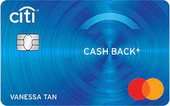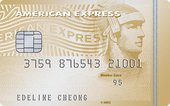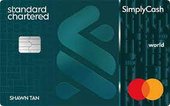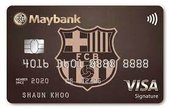What is an unlimited cashback credit card?
An unlimited cashback credit card is a type of credit card that offers a consistent, flat rate of cashback on all eligible purchases. They have no monthly or annual caps on the amount of cashback you can earn, which is their main differentiating feature. These cards are particularly popular for their simplicity and ease of use.
There is a drawback: the flat cashback rate is generally lower than what you could earn in specific categories with other types of cashback credit card.
Key features
- Flat cashback earn rate. As long as the transaction is eligible, you'll earn cashback. The rate is often around 1.5% and is consistent, regardless of the spending category.
- No monthly or annual caps. Unlike many cashback cards where there are caps to content with, there is no limit on the cashback you can earn.
- Minimum spend may not be required. Though not a ubiquitous feature, no minimum spending requirement is a common feature lower spenders may appreciate.
- Additional perks. While the focus is on cashback, additional benefits like complimentary travel insurance and petrol discounts may be on offer.
Who are unlimited cashback credit cards suitable for?
- The rewards lover. If you enjoy the thrill of earning cashback on every single purchase — who doesn't? — these cards are perfect for you. Unlike standard cashback credit cards, you don't have to worry that your spend is above the limit for earning cashback.
- The big spender. Are you someone who swipes your card more often than not? An unlimited cashback credit card gives you the liberty to spend whatever you want and still get rewarded.
- The savvy saver. If you're constantly on the lookout for ways to save money, why not have a card that rewards you with cashback for every dollar you spend?
Who credit cards with unlimited cashback are not suitable for
- Category-specific big spenders. If the majority of your spending is on groceries, petrol, or dining, you might benefit more from a card with higher cashback rates for those specific spending categories.
- Travel hackers. Like flying at the pointy end or just like using points to reduce the ticket price? If that's the case for you, cards that offer travel rewards, miles, or other travel-specific benefits might be more beneficial instead of a flat cashback rate.
- Balance carriers. Cashback cards — whether limited or unlimited — are most effective when you can pay off the balance each month to avoid interest charges, which will quickly negate the value of any cashback earned.
- Low spending money savers. If you don't spend much on your credit card, the cashback earned may not be significant. A credit card with no annual fee might be a better and cheaper fit.
Unlimited vs. tiered cashback credit cards
Unsure which is for you? Here's an example of how spending with an unlimited cashback credit card compares to a tiered cashback credit card.
The cards
- Unlimited cashback card. 1.5% cashback on all spending, with no caps, tiers, categorisation, or minimum spend required.
- Tiered cashback card. 3% cashback on dining, 2% on groceries, and 1% on all other spending. The card requires a minimum spend of $500 per month to qualify for these rates, otherwise the base rate of 0.3% applies.
Example scenario
You have the following monthly expenses:
- Dining = $400
- Groceries = $300
- Online shopping = $200
- Utilities = $100
- Total monthly spending = $1,000
Unlimited cashback card earnings
$1,000 x 1.5% = $15 cashback.
Tiered cashback card earnings
- Cashback for dining: $400 x 3% = $12
- Cashback for groceries: $300 x 2% = $6
- Cashback for online shopping: $200 x 1% = $2
- Cashback for utilities: $100 x 1% = $1
- Total cashback: $21
Results
In this example, the tiered cashback card offers more value based on this spending pattern. However, it's important to note that this only applies when the minimum spending requirement has been met. Should spending be lower than that threshold, the cashback rate would plummet to 0.3%, making the unlimited cashback card a better option.
As is the case when choosing any credit card, the best one for you depends on your spending habits and what you want to achieve.
What to compare for unlimited cashback credit cards
- Cashback rates. How much can you expect to get with each card? Is it a flat rate across the board or does it vary? If so, will you spend much in the categories that earn most?
- Cashback terms and conditions. As you might expect, banks don't hand out money freely. Check what specific rules or criteria they have in place and work out how they could affect you.
- Annual fees. Will the card's benefits justify the cost? Can the annual fee be waived?
- Foreign currency transactions. Planning to travel or shop online? Check if the card offers cashback on foreign currency transactions as well. Is the card fee-free on foreign transactions?
How to compare credit cards with unlimited cashback
- Start your research by making a list of all the available unlimited cashback credit cards in Singapore (see the comparison table above).
- Considering your spending habits, determine how much cashback each card could earn for you and the features that will benefit you the most.
- Review each card's approval criteria (minimum income, residency, etc.) and make sure you meet them before applying.
Pros and cons
Pros
- Earn cashback on every purchase without worrying about limits.
- Simplified rewards structure because there is no maximum cap.
- Save money.
Cons
- Annual fees that can negate cashback value for lower spenders.
- Cashback earn rates likely to reduce after a certain amount spent (or just be low).
FAQs
How do unlimited cashback credit cards work?
Unlimited cashback credit cards reward cardholders with a percentage of cash back on every purchase without any spending caps. That is the key difference, since some cards have an overall limit on how much can be earned.
What is the main difference between unlimited and tiered cashback cards?
Unlimited cashback credit cards earn cashback with no cap, whereas tiered cashback cards have earn rates that vary depending on transaction categories, tiers, and caps.




